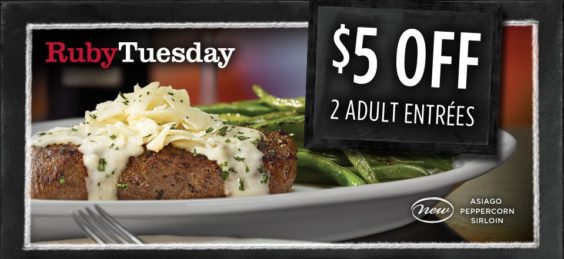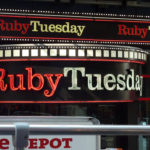To hear the way executives of the Ruby Tuesday restaurant chain have talked about coupons the past year and a half or so, you’d think coupon users are not exactly welcome there. “We’re pulling back on coupons,” they’ve said. “We just want to keep pushing more and more towards people who are non-coupon,” and “We just need… to attract more regular casual dining users instead of just the coupon users.”
Those darned “coupon users.”
Back in October, Coupons in the News reported on Ruby Tuesday’s recent strategy of cutting back on coupons – and how that hasn’t exactly helped reverse the fortunes of the struggling chain. Three months later, after another disappointing quarter, the restaurant chain and its new CEO are acknowledging that coupons aren’t really all bad.
After more discussion of “lower coupon expense” and “less coupon users” on its quarterly conference call with investors last week, Credit Suisse restaurant analyst Keith Siegner put it bluntly: “An interesting topic of discussion here at this company for, say, the last 1.5 years or so has been kind of this move away from couponing – almost a discussion of coupons as if they were unhealthy.” As competitors ramp up their use of coupons, how does Ruby Tuesday, then, justify doing the opposite?
CEO J.J. Buettgen, who only just joined the company in November, offered a more coupon-friendly perspective than his predecessor, Ruby Tuesday founder and CEO Sandy Beall. “If we were 100% reliant upon coupons, that would be dangerous,” Buettgen said. “On the other hand, to totally walk away from price incentives like coupons in such a competitive environment, in such a challenging consumer environment, would be a foolish decision.”
Buettgen came to Ruby Tuesday from Darden Restaurants, the parent company of similar casual dining chains like Olive Garden and Red Lobster. “Large chains have been increasing use of promotional price incentives,” including coupons, Darden COO Andrew Madsen said last month. “The promotional intensity has, if anything, been ramping up.”
So can Ruby Tuesday afford to sit out a couponing-and-price war for increasingly budget-conscious customers? Apparently not. As of this writing, if you visit RubyTuesday.com, you’re greeted by a popup window offering a coupon for $5 off two adult entrees. Before he left the company, Beall had insisted he wasn’t actually doing away with coupons altogether, but tinkering with them to see how low they could go. A “‘buy one, get one 50% off’ offer actually redeems almost as well as ‘buy one, get one’,” he said last July. “So there’s a significant cost savings there for us.”
A lower-value coupon is better than no coupon at all, especially to those most likely to use them. A recent study by the food industry consulting firm Technomic found that Millennials are more likely to visit casual dining restaurants than Generation Xers or Baby Boomers – and they’re also the group most influenced by coupons when choosing where to eat.
Still, it’s a tough choice for restaurants that are struggling in this economy – would they rather lose money by filling their seats with coupon users, or lose money by having coupon users go elsewhere? “Coupons are good for short-term,” Beall insisted last year, “but they’re not going to help build the business long term.”
Following its disappointing quarter, Ruby Tuesday announced it would close two dozen restaurants, including its entire Marlin & Ray’s seafood chain. When it comes to keeping its remaining locations in business, Ruby Tuesday may find that coupon-using customers are better than no customers at all.











